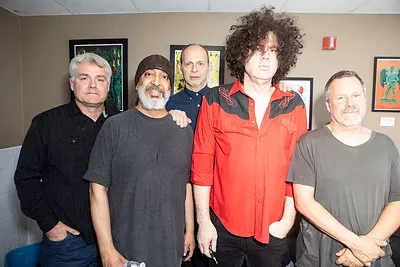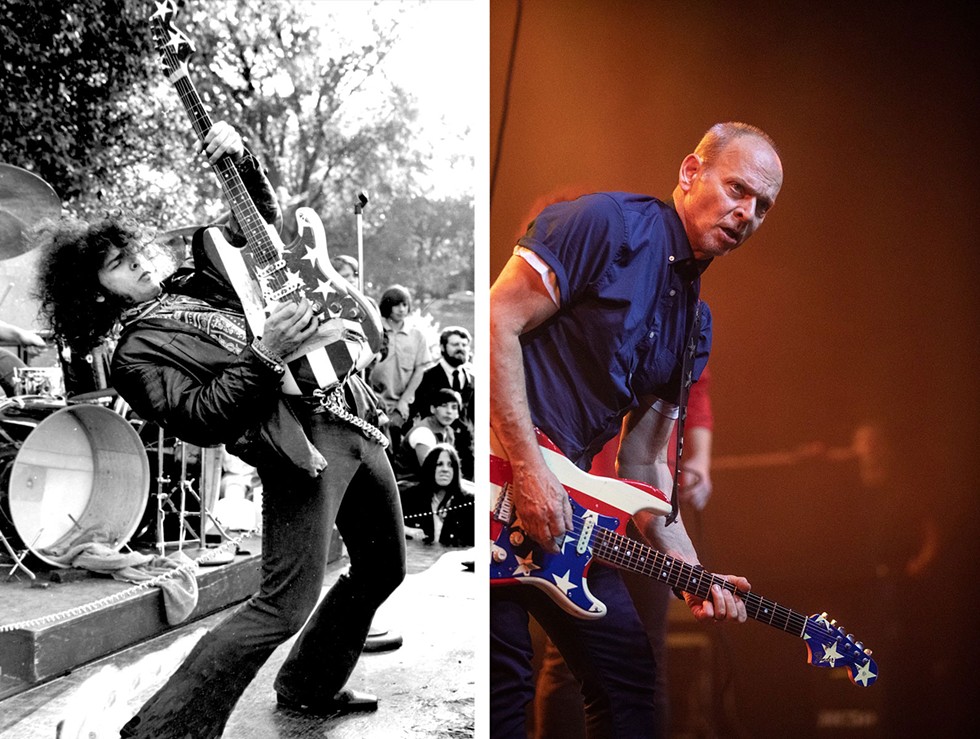In conversation, Wayne Kramer is a gentleman. Not overly warm, but certainly not unfriendly — which might be somewhat surprising considered his band the MC5 famously announced, "It's time to kick out the jams, motherfuckers!" on one of the most influential rock 'n' roll albums of all time.
He pauses before answering questions, taking a measured approach. That's understandable; he's been in the firing line a bit as of late.
Every rock fan, it would seem, has an opinion about Kramer. The MC5 guitarist polarizes opinions among fans of his old band simply by existing. Perhaps it's understandable; Kramer proclaims himself to be the curator of the MC5's legacy, the keeper of the flame. Heckles naturally rise.
Singer Rob Tyner, fellow guitarist Fred "Sonic" Smith, and bassist Michael Davis are sadly no longer with us (the latter passing most recently in 2012), though drummer Dennis "Machine Gun" Thompson is. But even when Davis was alive, and the trio of Davis, Kramer, and Thompson went out on tour as DKT/MC5, there was a nagging feeling that Kramer saw himself as the leader, the organizer, the coordinator, the boss.
People have been rubbed the wrong way by all of this. Some didn't like that the DKT/MC5 band happened at all. Others objected to what they perceive as Kramer putting a stop to the release of David Thomas and Laurel Legler's documentary movie MC5: A True Testimonial. And now, they really don't like the fact that the guitarist is hitting the road again as part of a supergroup dubbed MC50 to celebrate the 50th anniversary of the Kick Out the Jams album.
Every word Kramer has said, hasn't said, implied, denied, and everything in-between, has been turned over and examined, leading to recent accusations that he claimed to be the "last man standing" from the MC5, despite Thompson still being very much alive. Kramer claims to have been misquoted, which again explains his thoughtfulness when talking to the press.
The easiest thing to do if you don't want to be misquoted, of course, is to write your own book, and this year, Kramer dropped The Hard Stuff: Dope, Crime, the MC5, and My Life of Impossibilities. As we wrote at the time, "It's simultaneously brutally honest, heart-breaking, hilarious, and life-affirming. The guitarist also does a great job detailing his time post-MC5, up to the DKT/MC5 period and beyond."
When we speak to Kramer on the phone, he's s just come out of the hospital where he was treated for kidney stones. He is still recuperating, telling us that he was feeling fatigued and out of his groove, but still in good form.
"My friends had been suggesting for years that I write a book," he says. "I struggled with it because I could never come up with an ending."
But then five years ago, Kramer entered a new chapter in his life, fathering a son.
"All of a sudden I realized, there's the perfect ending," he says. "You had one life before your son came, and then after your son arrived you started a whole different life. It became clear to me that this was the perfect way to wrap up this first series of misadventures, and then embark on a whole new set of challenges."
This writer has interviewed Kramer about his MC5 life before, having written the book Sonically Speaking back in 2006 (which came out in the U.S. on Wayne State Press in 2010). Davis also put pen to paper for I Brought Down the MC5, also released this year, and it's also well known that late Rolling Stone journalist Ben Edmonds had been working on an MC5 book for decades before he died in 2016.
"Ben Edmonds was a complex fellow and a dear friend, and I thought if anyone was going to write a definitive MC5 book, it could be Ben because he really understood what the band represented at its most complex," Kramer says. "But then, Ben also suffered from an inability to finish things. He never finished the book."
But the way Kramer sees it, that doesn't matter because his book is a memoir. "[It's] stories from a life, not the story of a life," he says. "The MC5 only took up an eight- or 10-year period in my life. Today, I'm 70 years old. There's a lot of other things that have happened."
The Hard Stuff details a whole lot of it, including, but not limited to, the MC5 being the house band at Detroit's storied Grande Ballroom, Detroit's J.L. Hudson department store banning Kick Out the Jams due to its famous obscenity, John Sinclair and the White Panther Party, Kramer's battle with drugs and his subsequent time behind bars, Gang War (his band with New York Dolls and Heartbreakers man Johnny Thunders), his solo work, and so much more. That's a lot of time, a lot of experiences to recall.
"I remember a fair amount," Kramer says. "All the jokes about 'if you remember the '60s you weren't there,' that's not really true. I remember almost all of it."
Kramer says as "the curator of the MC5's legacy" he "wanted to write a book that would tell the story from the inside, from the perspective of the guy who started the band and was there through all of it." And there was another motivator, too: "Plus, I wanted my son to know the story of his father's life up to the day that he arrived and I began my life with him," he says.
‘All the jokes about “if you remember the ‘60s you weren’t there,” that’s not really true. I remember almost all of it.’
tweet this
Writing a book is a huge undertaking. An autobiography might be slightly easier, but still, there is a lot of work involved. Kramer spent close to five years on his, and he didn't necessarily document it in linear order.
"Something would trigger a memory, and I would just sit down and write that whole episode," he says. "Because memory isn't sequential. Memory is kind of random access. It was a challenge to get everything in the right order. That was real work, and then I had a terrific editor who immediately threw away three chapters. And there's a lot of things that you naturally shy away from or didn't explore in enough depth, that I had to go back and revisit. My loyalty is to the truth, and to writing it as honestly as I'm capable of."
Being loyal to the truth and being honest does, of course, mean revisiting some incredibly difficult times in his life. Thankfully, Kramer says that he had already worked through most of the pain associated with addiction and prison before starting the book.
"There was a lot of it that I had to get in there and figure out, how did I feel about that?" he says. "What was I feeling at that point? One thing that I discovered was that the MC5 was constantly under an inordinate amount of pressure from all fronts. The internal pressures in the band, the pressure to be a success, the police harassment, the federal government undermining our efforts, our own humanness and inability to face things head-on — just the complexities of trying to get five individuals on the same wavelength and produce work of a durable value. It's more than your average rock band."
That might be the understatement of the year. While the MC5 were perhaps more of a conventional rock 'n' roll band from a musicianship sense than their "baby brother band" the Stooges (who were far more likely to drag out a vacuum cleaner and some peanut butter on stage), the fiery blend of personalities, the organic influence of Motown and jazz, a spectacular live show, and five technically brilliant — if unrefined — players helped propel the MC5 way beyond the average.
In his book, as with Davis', the author digs into all of that, albeit, naturally, from a one-sided angle. He also talks candidly of the DKT/MC5 years, and the mixed feelings that came out of that.
"I was really happy to create a platform where Michael and Dennis could both get out there and be recognized for their contribution and enjoy some of the appreciation that music fans have for the music of the MC5," Kramer says. "It was heartwarming to me to see them finish the show, have big smiles on their faces, and know that they just did something. They did something a long time ago, and now they get to be recognized for it. Get their names in the paper, pictures, and people talking about them, and to make a good payday too. Having been in the MC5 did not leave any of us independently wealthy. So it was nice to be able to provide some income too."
How amiable the whole DKT/MC5 experience was depends on who you ask, and perhaps when you ask them. The families of Tyner and Smith certainly didn't like it and, having spoken to the three men during and just after the various tours, it was clear that they were going through ups and downs in their relationships. Now that Kramer is taking this MC50 tour on the road, it has been noted that Thompson isn't involved.
"I don't know what Dennis is going to do," Kramer says. "I invited him, he originally agreed to perform, then he changed his mind and said he didn't want to perform, then he changed his mind again and said he did want to perform, then he changed his mind again and said he didn't want to. So I have no idea what's going on with him."
Kramer has assembled quite the supergroup for the trek, mind you. Brendan Canty of Fugazi will sit on Thompson's spiritual stool, Faith No More's Bill Gould will play bass, Soundgarden's Kim Thayil will play guitar alongside Kramer, and Zen Guerrilla's Marcus Durant will front the band. The latter is a mildly surprising but inspired choice; Zen Guerrilla, though not super-well known, share's the 5's ability to blend rip-roaring garage rock with pure R&B.

"I had two criteria in mind," Kramer says. "One was that they had to be good people. Genial, mature — not that being an alcoholic or an addict makes you a bad person, but I'm not available for that kind of behavior. I've figured out a way to live where drinking and drugging isn't necessary, and I certainly don't want it in my workplace. And I wanted to have people whose company I enjoyed, who were interested in the world around them and genial and intellectually curious. This is hard work, doing a tour like this. You're in a very closed space with the same people, working six nights a week, for months. If everyone doesn't take responsibility for being a positive force, things can get unpleasant real quick. So I wanted to have good people, and I wanted to have world-class players. I wanted the best possible musicians."
Kramer also wanted the various musicians to have their own connection with the music of the MC5, rather than four men taking a paid gig. This was true for each of these guys — Kick Out the Jams has a special place in their musical education.
"The music meant something to them, and that was important to me," he says. "We want to play this stuff well. We want to honor the material, and I want it to be played as good as it can possibly be played. I know the MC5 has a reputation for being sloppy, volatile, and in the moment, but I think there's a way to be spontaneous and to play with precision at the same time. I don't think they're mutually exclusive. I think you can improvise and play the arrangement at the same time."
"The MC5 were one of the few bands that I idolized growing up in DC," says Canty. "They had politics, chops, and unfathomable energy. They played protests, and made music that sounded like a celebration of the movement at the same time. They informed so many of us in the punk rock world. No matter where you heard it, hearing Kick out the Jams for the first time rewrote what you thought you knew of the '60s, and a band's potential. It's been great getting to know and play with Wayne. He still can play like a motherfucker, and his politics are front and center. He is smart and righteous, and I'm happy to be in his army on this one."
‘I think there’s a way to be spontaneous and to play with precision at the same time. I don’t think they’re mutually exclusive.’
tweet this
"For me, this is the kind of tour that is 100 percent about music," says Gould. "Every single person on this tour wants to be here, and do the material justice, and for this reason it's a fantastic experience to be part of. Learning the songs from Wayne himself makes me realize the broad range of influences that went into making this music. It was adventurous then but in some ways is even more adventurous now."
"I've been feeding my ears with the soul of the MC5 since before I was a teenager," adds Durant. "For me, this is biblical."
One might think that, after five full decades, Kramer may have grown a little tired of playing tunes like "Kick Out the Jams" and "Ramblin' Rose," night after night with various musicians, but he says nothing could be further from the truth.
"I have never played the song where it wasn't the most exciting thing I was doing," he says. "There's something built into those two songs in particular that you just can't play them and be lackadaisical about it. There's no casual way to play 'Kick Out the Jams.'"
Time, as they say, waits for nobody. We all get old, trends shift, etc, etc. But the MC5 has managed to remain at least partially in vogue through it all. Whether it's Jennifer Aniston as Rachel from Friends wearing a band shirt on the show, or the DKT band's numerous appearances at youth-focused festivals, or the simple fact that so many contemporary bands continue to cite them as an influence — the MC5 won't stop being fucking cool.
"The excitement that's built into the sound of these songs, the way we arrange the songs, the way we divided up the guitar parts, and how the vocals worked in and out — those things, it's even better than '68," says Kramer. "Mostly, I'm playing this stuff today in 2018, and we live in a different world now. Really, the excitement is in that space in between then and now, and how does this music hold up. I'm happy to say that it holds up pretty damn well."
While there will be cynicism thrown from the peanut gallery, as is the case with anything new and MC5-related over the past two decades or so, the shows promise to be special. Kramer and his assembled group will smash through the debut album, while pulling out some faves from the other two records.
"Maybe some of those obscure covers that we used to do," Kramer says. "The MC5 had big listening tastes. We used to cover a Nina Simone tune called 'The King of Love' about Martin Luther King.' We covered 'Let the Good Times Roll' and we covered 'The Fire of Love' by Jody Reynolds. We did a lot of strange material. I might want to dig some of that stuff up too. Plus, the songs from the other two albums, the great Fred Smith songs like 'Shakin' Street,' 'Sister Anne,' and 'Over and Over,' plus Tyner's tunes. There's a lot of great material in there."
For Kramer, who has been living in Los Angeles for some time now, the Detroit shows will still be hometown gigs. The band has three shows scheduled: One on Friday at Saint Andrew's Hall and one on Saturday at the Fillmore. On Tuesday, the band will record a live-to-acetate version of Kick Out the Jams at Jack White's Third Man Records Cass Corridor, 50 years to the day that they recorded the original live at the Grande. The MC5, as the name hammers home, will forever be intrinsically linked with this city.
"My relationship with Detroit is complex," Kramer says. "I was born and raised there, and it formed me. But at a certain point I had to leave. It had gotten too dangerous for me. The people I associated with were frankly not good people. I'd just finished serving a prison term, and I didn't want to go back to prison. I moved to New York where I would be safe."
On the flip side, SoCal living is suiting him just fine.
"I love life in Los Angeles," he says. "It suits my activities. I paid my mortgage by writing music for film and television. This is where we do that work."
Kramer was back in Detroit fairly recently to launch a Jail Guitar Doors songwriting workshop at the Detroit Reentry Center. Named after the Clash song that references Kramer's drug dealing days, JGD was started by Billy Bragg in the U.K. and carried into the USA by Kramer, and aims to take guitars into prisons. Howling Diablos mainman Tino Gross has been working on the program with Kramer.
"My first day in prison, teaching for Jail Guitar Doors, will always stay with me," Gross says. "I'm face to face with a group of hard convicts in orange jumpsuits, with nothing more than a guitar in my hand. I started showing the guys how to write songs based on their own experiences, and by the end of the session, we were writing and singing songs like guys who had been together for years. The power of music to rehabilitate is incredible, and helps prisoners find a way back into society. Wayne knows that is an essential part of life, to be of 'service' to someone else, and by doing so, you are helping society. We are all in this life together."
He says it's a battle he'll continue to fight. "The war on drugs has been an abject failure," he says. "The drug prohibition has killed more people than drugs ever could. It's terrible — if I had my way, I would call it a crime against humanity, and I would charge the responsible government officials with that and I'd have them tried in the Hague for crimes against humanity."
So that's Kramer. All these years down the line, he's still fighting authority when he sees injustice. He's still speaking out and he's still pissing people off — politically, or because of his use (even adapted) of the MC5 name.
"My sense is, I'm 70 years old," he says. "I do what the fuck I want to do."
MC50 performs on Friday, Oct. 26 at Saint Andrew's Hall, 431 E. Congress St., Detroit; 313-961-8961; saintandrewsdetroit.com; Doors at 8 p.m.; Tickets are $29+; and Saturday, Oct. 27 at the Fillmore, 2115 Woodward Ave., Detroit; 313-961-5451; thefillmoredetroit.com; Doors at 7:30 p.m.; Tickets are $24+.
Get our top picks for the best events in Detroit every Thursday morning. Sign up for our events newsletter.








